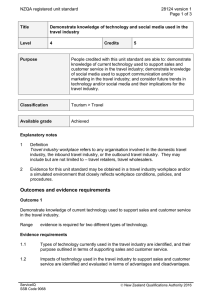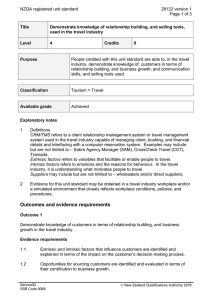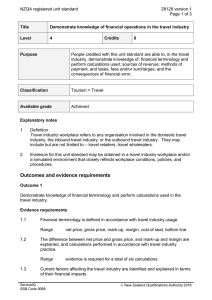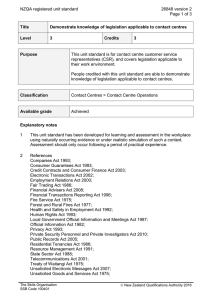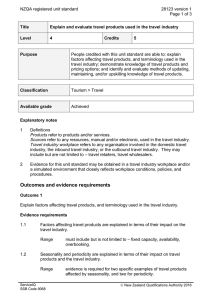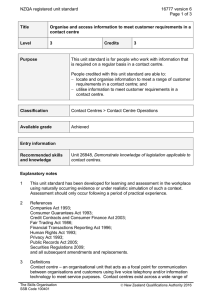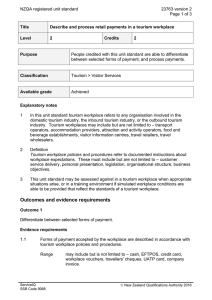NZQA registered unit standard 28750 version 1 Page 1 of 4
advertisement
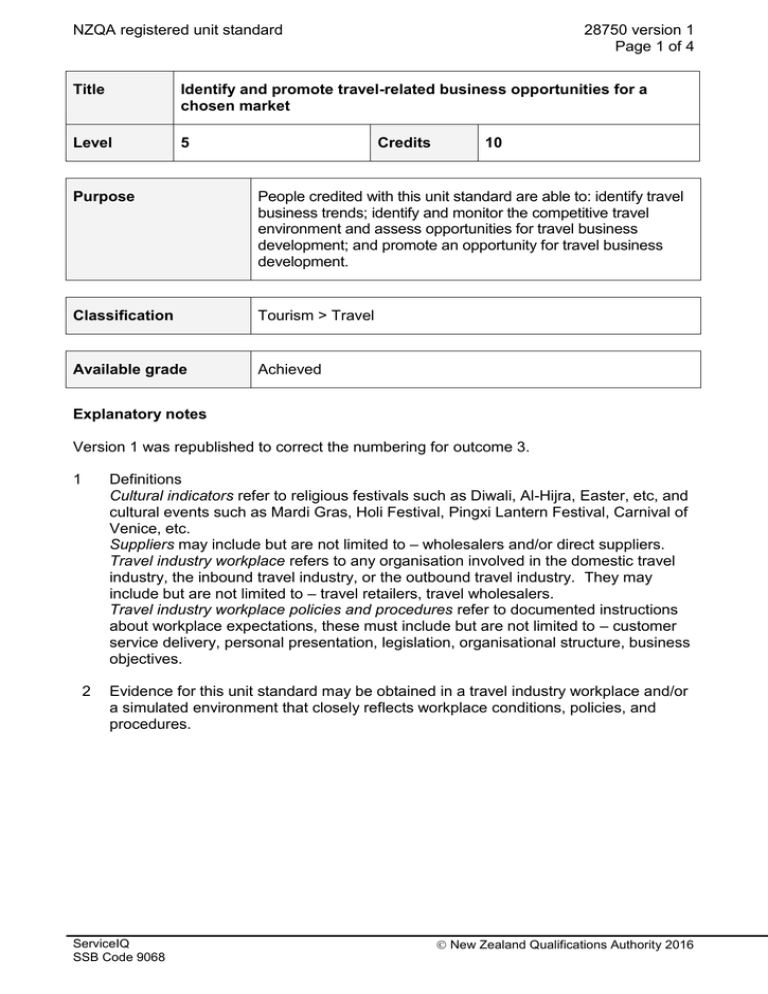
NZQA registered unit standard 28750 version 1 Page 1 of 4 Title Identify and promote travel-related business opportunities for a chosen market Level 5 Credits 10 Purpose People credited with this unit standard are able to: identify travel business trends; identify and monitor the competitive travel environment and assess opportunities for travel business development; and promote an opportunity for travel business development. Classification Tourism > Travel Available grade Achieved Explanatory notes Version 1 was republished to correct the numbering for outcome 3. 1 Definitions Cultural indicators refer to religious festivals such as Diwali, Al-Hijra, Easter, etc, and cultural events such as Mardi Gras, Holi Festival, Pingxi Lantern Festival, Carnival of Venice, etc. Suppliers may include but are not limited to – wholesalers and/or direct suppliers. Travel industry workplace refers to any organisation involved in the domestic travel industry, the inbound travel industry, or the outbound travel industry. They may include but are not limited to – travel retailers, travel wholesalers. Travel industry workplace policies and procedures refer to documented instructions about workplace expectations, these must include but are not limited to – customer service delivery, personal presentation, legislation, organisational structure, business objectives. 2 Evidence for this unit standard may be obtained in a travel industry workplace and/or a simulated environment that closely reflects workplace conditions, policies, and procedures. ServiceIQ SSB Code 9068 New Zealand Qualifications Authority 2016 NZQA registered unit standard 28750 version 1 Page 2 of 4 Outcomes and evidence requirements Outcome 1 Identify travel business trends. Evidence requirements 1.1 The travel business environment is monitored, and business opportunities are assessed in terms of possible impact upon current operations and potential development of the travel business. Range 1.2 Relevant travel business economic indicators are selected and assessed in terms of implications for travel business development. Range 1.3 may include but is not limited to – inflation, unemployment, interest rates, business confidence, availability of credit, disposable income, gross domestic product, national income indicators. Relevant industry or sector indicators are identified and assessed in terms of implications for business development. Range 1.4 may include but are not limited to – changes to the business environment for the travel industry, trends in international travel, changes to wholesaler and carrier fares and products. may include but is not limited to – population trends; business surveys; specialist trade, industry, or service surveys. Relevant cultural indicators are identified and determined in terms of implications for business development. Outcome 2 Identify and monitor the competitive travel environment and assess opportunities for travel business development. Evidence requirements 2.1 Existing travel product and/or service range is reviewed, and opportunities for further development of existing products and/or services, are identified and researched in terms of potential contribution to travel business development. 2.2 Opportunities are evaluated, benefits are identified, and their contributions to business advancement are assessed in terms of attractiveness and viability as an option for further business development. Range ServiceIQ SSB Code 9068 evaluation may include but is not limited to – sales volume; market share; profit estimates; cost; volume; profit analysis; break-even analysis; cash flow implications; capital requirements. New Zealand Qualifications Authority 2016 NZQA registered unit standard 2.3 Competing travel products and/or services are monitored, and opportunities for development of product and/or service range are identified and assessed. assessment of opportunities may include but is not limited to – potential contribution to sales volume, market growth, market share, profitability. Range 2.4 28750 version 1 Page 3 of 4 Competitor markets are investigated, and opportunities to enter markets with existing or new products are assessed. assessment of opportunities may include but is not limited to – potential contribution to sales volume, market growth, market share, profitability. Potential new markets are researched, and opportunities for development of product and/or service range are identified and assessed. Range 2.5 assessment of opportunities may include but is not limited to – potential contribution to sales volume, market growth, market share, profitability. Range Outcome 3 Promote an opportunity for travel business development. Evidence requirements 3.1 Avenues for promotion of the travel business opportunity are identified, evaluated and appropriateness identified. 3.2 Travel promotion activities and events are planned. Range minimum of two required. 3.3 Travel promotion activities and events are monitored for uptake and increase in travel business. 3.4 Travel promotion activities are evaluated for achievement of business goals and outcomes and reported in accordance with travel industry workplace policies and procedures. Planned review date 31 December 2020 Status information and last date for assessment for superseded versions Process Version Date Last Date for Assessment Registration 1 21 May 2015 N/A Republished 1 15 October 2015 N/A ServiceIQ SSB Code 9068 New Zealand Qualifications Authority 2016 NZQA registered unit standard 28750 version 1 Page 4 of 4 Consent and Moderation Requirements (CMR) reference 0078 This CMR can be accessed at http://www.nzqa.govt.nz/framework/search/index.do. Please note Providers must be granted consent to assess against standards (accredited) by NZQA, before they can report credits from assessment against unit standards or deliver courses of study leading to that assessment. Industry Training Organisations must be granted consent to assess against standards by NZQA before they can register credits from assessment against unit standards. Providers and Industry Training Organisations, which have been granted consent and which are assessing against unit standards must engage with the moderation system that applies to those standards. Requirements for consent to assess and an outline of the moderation system that applies to this standard are outlined in the Consent and Moderation Requirements (CMR). The CMR also includes useful information about special requirements for organisations wishing to develop education and training programmes, such as minimum qualifications for tutors and assessors, and special resource requirements. Comments on this unit standard Please contact ServiceIQ qualifications@serviceiq.org.nz if you wish to suggest changes to the content of this unit standard. ServiceIQ SSB Code 9068 New Zealand Qualifications Authority 2016
